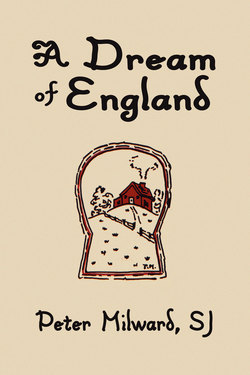A Dream of England

Описание книги
For me England isn’t so much a place as a name, an ideal, a dream. The name is attached to a little Western isle, set, as Shakespeare observes, in the silver sea. Or rather, if I may correct Shakespeare’s observation, it is attached not to the whole isle but only to half of it, the other half being divided between the neighbouring countries of Wales and Scotland. Even within that little half there are so many varieties of place and climate as to defy all attempts to reduce them to a simple unity.
The ideal is a shining vision which has to be seen, like the light of the sun, not in itself but in its various refractions. England, as Shelley says of life, may be compared to “a dome of many-coloured glass” that “stains the white radiance of eternity”. She – for I think of her as a lady – is one in Canterbury and another in York, one in her cities and another in her countryside, one in her Southern counties and another in the Midlands and East Anglia, and yet another in the wild lands North of the Humber. England is different in different places, and yet in them all and above them all she remains herself, as Shakespeare says of himself, ever one and the same.
Оглавление
Peter Milward. A Dream of England
A Dream of England. Peter Milward, SJ
Preface
Gateway to England
Three English Homes
The Heart of England
The Country Churchyard
A Historic University
A Tale of Two Cathedrals
The Museum City
The Lakes
Pilgrimage to the Tower
The Englishman as He Isn’t
The Englishman at Home
A Place of One’s Own
Tweedledum and Tweedledee
The Englishman as Shakespeare Saw Him
The People Who Haven’t Spoken Yet
Who’s Who and Why
Pleased as Punch
The Englishman as He Is
The English Character
English Humour
The Changing Face of England
The Changing Image of London
Отрывок из книги
For me England isn’t so much a place as a name, an ideal, a dream. The name is attached to a little Western isle, set, as Shakespeare observes, in the silver sea. Or rather, if I may correct Shakespeare’s observation, it is attached not to the whole isle but only to half of it, the other half being divided between the neighbouring countries of Wales and Scotland. Even within that little half there are so many varieties of place and climate as to defy all attempts to reduce them to a simple unity.
The ideal is a shining vision which has to be seen, like the light of the sun, not in itself but in its various refractions. England, as Shelley says of life, may be compared to “a dome of many-coloured glass” that “stains the white radiance of eternity”. She – for I think of her as a lady – is one in Canterbury and another in York, one in her cities and another in her countryside, one in her Southern counties and another in the Midlands and East Anglia, and yet another in the wild lands North of the Humber. England is different in different places, and yet in them all and above them all she remains herself, as Shakespeare says of himself, ever one and the same.
.....
It was by the West Gate that pilgrims from London in Chaucer’s time would have made their way into the city, following the London Road, then turning right past the old road to Whitstable and the church of St. Dunstan’s. Here they would be obliged to slow down their horses, if they were on horseback, from a “canter” – a word that is etymologically derived from this very pilgrimage. The pilgrims would have spent much of their time on the pilgrimage chatting and telling each other merry tales, but towards the end they would have spurred on their horses to “a Canterbury gallop” so as to reach the city in good time before nightfall.
The memory of these Canterbury pilgrims, with all their merry tales and jests on the way, may also remind us of the serious purpose of their pilgrimage within the city. Up till now I have been dwelling on the gate, as I find it so impressive and full of symbolism, but it is only a gate. It is for defence, not residence – though in the past it has been used as a prison. Only when you have passed through or round the gate do you come to the homes of the citizens, as well as the inns and “hospitals” for visitors from outside. I should explain that the “hospitals” are the old buildings put up not for the sick – as we might think from the modern meaning of the word – but for the mediaeval pilgrims. Originally, the word “hospital”, like the related word “hospice”, meant a house where guests (hospites, in Latin) could find accommodation.
.....
